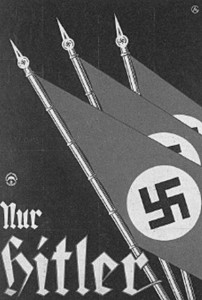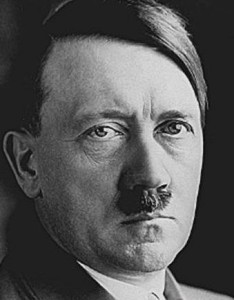Thus, the suggestion that Hitler’s rise to power was fueled by Germany’s economic woes simply does not hold up. So now let’s take a look at the political situation in that country during the period known as the Weimar Republic.
It would be naive to deny the fact that Germany had spent the years since 1919 in the iron grip of the victors of the First World War. And that control was manifested in many ways.[1] In the political arena, it was carried out by Germany’s Social Democratic Party, led by Stresemann and Ebert, who, along with the “sleeping” Prince Max von Baden, so deftly staged a revolution and the abdication of the kaiser. It was then that the Social Democrats became the country’s ruling party, they drafted a Constitution that included never-ending cycles of elections, and their leader, Ebert, became Germany’s first president.[2]
It was this party, or rather its foreign backers, that the country could thank for the political merry-go-round that lasted until the Nazis came to power. Over the course of 14 years (1919-1933), Germany was subjected to nine Reichstag elections![3] One of the democratic provisions of the Weimar Constitution stipulated that Reichstag elections be held every two years. The aim of this provision was to give ordinary Germans complete, ongoing control of their parliament. But in practice, this meant only that the public lived in a constant atmosphere of overheated political fervor and endless political campaigns.

The country was turning into a train wreck. “A sense of total discouragement and meaninglessness pervaded everything,”[4] writes Joachim Fest, describing the emotions of the German people during the economic crisis, but those words could easily be applied to the entire history of the Weimar Republic.
Britain, France, and the US tried long and hard to find ways to legally midwife Hitler’s political victory in Germany. Nazi election poster
Was this provision merely a haphazard inclusion in the Weimar Constitution? Of course not! London and Washington needed a constitution that included a “Trojan horse” of permanent instability if they were to steer the political life of Germany in the requisite direction. After all, elections are more than just leaflets and ballots, they also involve scandals and mortal struggles. Candidates and parties need support, assistance, and money, and thus they can be controlled by preventing the creation of a strong, new version of the German state, which at the end of the 19th century had become the fastest-developing player on the global stage. The obliteration of Germany during the First World War had demanded Herculean efforts, huge sums of money, and millions of lives. Is it possible to believe that after such an experience England and the United States would have shied away from installing a puppet regime in Germany?
But it wasn’t just the parliament that had become a merry-go-round – the same could be seen in the executive branch. During the 14 years of the Weimar democracy, 14 different men served as chancellor![5]
And in that kingdom of the absurd there appeared a leader and a party that renounced this whole circus. That alone won them sympathy. “The Marxist parties and their allies had 14 years to show what they could do. The result is a heap of ruins,” Hitler claimed, berating his opponents about the state of his nation.
People were not drawn to the Nazis out of love for the NSDAP, but more because they were sick to death of the parties offering an alternative to Hitler. For example, the percentage of voters who were allied with the Social Democratic Party dropped from 37.9% in 1919 to 18.3% by March of 1933, and the number of backers of the German Democratic Party shrank from 18.6% to 0.8%during the same period.
 But even under these circumstances Hitler was unable to win elections! The idea that the Nazi leader was appointed chancellor because his party won the election is yet another convenient falsehood espoused by historians. Adolf Hitler was sworn in as chancellor on January 30, 1933. The last election to be held before that date was on Nov. 6, 1932, in which the Nazi Party won 33.1% of the vote. The NSDAP was the largest party in the parliament, but it did not hold an absolute majority. Furthermore, when compared with the previous election, the Nazis were on a downward trend: on July 31, 1932 they won 37.4% of the vote, but their level of support had dropped by 4.3% by Nov.6, 1932. The idea that Hitler won the election is a myth. He was simply appointed head of the country! Someone applied such pressure on Germany’s political elite that Hitler’s “deficiencies” and “oddities” seem to have been all but forgotten. How was this possible?
But even under these circumstances Hitler was unable to win elections! The idea that the Nazi leader was appointed chancellor because his party won the election is yet another convenient falsehood espoused by historians. Adolf Hitler was sworn in as chancellor on January 30, 1933. The last election to be held before that date was on Nov. 6, 1932, in which the Nazi Party won 33.1% of the vote. The NSDAP was the largest party in the parliament, but it did not hold an absolute majority. Furthermore, when compared with the previous election, the Nazis were on a downward trend: on July 31, 1932 they won 37.4% of the vote, but their level of support had dropped by 4.3% by Nov.6, 1932. The idea that Hitler won the election is a myth. He was simply appointed head of the country! Someone applied such pressure on Germany’s political elite that Hitler’s “deficiencies” and “oddities” seem to have been all but forgotten. How was this possible?
The fact is that democratic institutions in Germany had begun to retrench even before the Nazis came to power. In March 1930, when Hitler won only 18.3% of the vote, it became clear that despite all the efforts and the massive financing from unknown origins, Hitler was never going to win a parliamentary election. The German people were simply blessed with too much common sense. But Britain’s leaders were not content with this situation. After all, someone had to attack the USSR and eventually secure the stability there that the world’s rulers required. That means a backup plan was needed. And one was created.
In March 1930, the principles of parliamentary democracy were adjusted a bit in Germany.
Although previously the leader of the parliamentary majority had automatically became the chancellor, now the post was appointed by the country’s president, in accordance with article 48 of the Weimar constitution. In other words, the head of the government could appoint any German citizen, not solely the winner of the parliamentary election.
This was a dangerous move. It was desirable for the Nazis to win “fairly.” An analysis of the improbably large number of elections in Germany immediately prior to Hitler’s ascension to power suggests that the polls must have been intended to be held until the NSDAP could claim victory. But when it became clear that this would not work, Hitler was simply “appointed” chancellor.
So, could Hitler have been stopped? Yes. That could have been done if the country had not been turned into a political circus and if the German public had not been made weary of elections, which only inflated the number of supporters of the NSDAP. Ernst Hanfstaengl and others should not have been assigned to help groom the future Fuhrer so he could present himself as a respectable, well-mannered politician.
And above all – there was no legal basis for Hitler’s appointment as chancellor! Anyone could have been named to that position, anyone but the one individual who would use his nomination to become the most infamous criminal in human history. All this could have been done under one condition: if Hitler’s rise to power had not been demanded by external forces to which German politicians were unquestioningly submissive.
______________________
[1]As we know, the terms of Germany’s surrender at the end of World War I were spelled out in the Treaty of Versailles. The victors were meticulous and the treaty was quite detailed, but it did not include the most important point – the amount of reparations! The treaty contained only a general statement demanding that the German government pay compensation for the damages caused to the citizens of the Allied Powers and to fund pensions for the soldiers, widows, and surviving family members of the Entente forces. In other words, the guilty party was identified and convicted, but in the verdict they forgot to specify precisely how much he should suffer. The treaty established only the first payment due, totaling 20 billion marks. Imagine how much leverage remained in the hands of the victors! If the “correct” policies were followed, the amount of reparations could be reduced, but if the “wrong” actions were taken, those would increase sharply. But more to the point, it could not be challenged! It is interesting that the exact amount of the reparations was only named in 1928, when Trotsky fled into exile, and Hitler suddenly found himself with an unlimited line of credit at his disposal and began his charge toward the pinnacle of power.
[2]Only three presidents served the Weimar Republic: Friedrich Ebert (1919-1925), Paul von Hindenburg (1925–1934) and Adolf Hitler (1934–1945). Germans’ feelings about Ebert, who signed the Treaty of Versailles, were evident from the fact that, during his funeral, Cardinal von Faulhaber, Archbishop of Munich-Freising, categorically refused to order the church bells to be rung. And the fact that Ebert was a Jew later provided Hitler with a wonderful platform for anti-Semitic propaganda. For example, the Sept.12, 1932 Reichstag assembly was in session for only one day before being dissolved.
[3]Jan.19, 1919; June 6, 1920; May 4, 1924; Dec.7, 1924; May 20, 1928; Sept.14, 1930; July 31, 1932; Nov.6, 1932; and March 5, 1933. We are not including the election of Nov.12, 1933, when only Nazis were listed on the ballot.
[4]Fest, Joachim. Hitler. 2002. Pg. 269.
[5]Gustav Bauer (1919-1920), Hermann Müller (1920), ConstantinFehrenbach (1920-1921), Joseph Wirth (1921-1922), Wilhelm Cuno (1922-1923), Gustav Stresemann (1923), Wilhelm Marx (1923-1925), Hans Luther (1925-1926), Wilhelm Marx (1926-1928), Hermann Müller (1928–1930), Heinrich Brüning (1930–1932), Franz von Papen (1932), Kurt von Schleicher (1932-1933), and Adolf Hitler (1933–1945).
ORIENTAL REVIEW publishes exclusive translations of the chapters from Nikolay Starikov’s documentary research ““Who Made Hitler Attack Stalin” (St.Petersburg, 2008). The original text was subject to minor cuts by the OR editorial.
PREVIOUS EPISODES
Episode 11. A Soviet Quarter Century (1930-1955)
Episode 10. Who Organised the Famine in the USSR in 1932-1933?
Episode 9. How the British “Liberated” Greece
Episode 7. Britain and France Planned to Assault Soviet Union in 1940
Episode 6. Leon Trotsky, Father of German Nazism
Episode 5. Who paid for World War II?
Episode 4. Who ignited First World War?
Episode 3. Assassination in Sarajevo














Pingback: Episode 12. Why did Britain and the United States have no desire to prevent WWII? (I) | Oriental Review
Pingback: Episode 12. Why did Britain and the United States have no desire to prevent WWII? (IV) | Oriental Review
Pingback: Resowing dragon’s teeth in Europe 75 years later | Oriental Review
Pingback: Episode 12. Why did Britain and the United States have no desire to prevent WWII? (IV) – OrientalReview.org
if “someone was needed to attack the URSS” and this is why Hitler was helped to get the power, then why the british would make war to Germany over the Danzig dispute, and risk the German war effort to destroy them?
Pingback: L’Europe d’une guerre à l’autre (XII – 2) – Pourquoi la Grande-Bretagne et les États-Unis n’avaient-ils aucune envie d’empêcher la Seconde Guerre Mondiale? | Réseau International